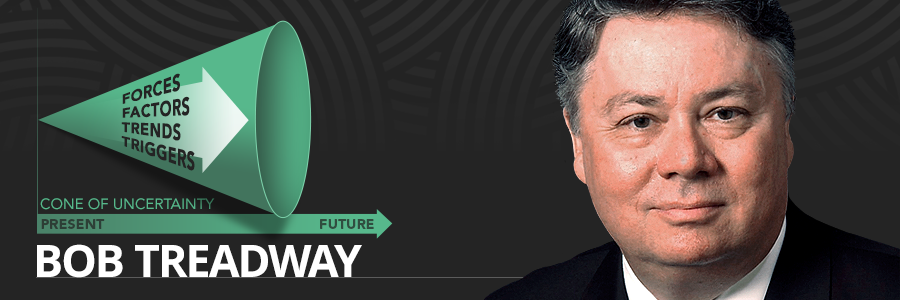No single set of skills and techniques will help you sustain and improve your team, organization, or even career more than anticipation. Most leaders have never taken a course or seminar on the subject. It wasn’t in the required curriculum for your university major, was it?
Effective anticipation sees not just the obvious that’s ahead but also the hidden, the hinted-at, the possible. The process need not be complicated. But it must be persistent. I urge you to adopt the approaches I list here. Habits of anticipation will stand you in good stead for your entire career, for your entire life.
Here is a “starter kit” for anticipation. Things to do, ways to think, and habits to adopt that allow you to see developments before they arrive, avoid nasty surprises, and take advantage of opportunity.
Widen and Lengthen Your View
The most successful business leaders keep themselves informed. They see media, listen to viewpoints, mine promising sources, and collect forward-looking contacts that see ahead. They leverage time saving summaries, look at sources with a future focus, and employ technology to push information their way. They team with peers and associates to compare notes, discover unusual insights, and gain novel perspective. They change up their sources and network to cast a wider net for signals of what’s ahead. Nothing goes over their head. They allow their curiosity to drive a continuous alertness to signals of the future. I list two excellent free daily resources at the end of this posting.
See the Significant
I’m often asked, “What should I pay attention to? There’s so much reading and information I’ve got to see already.” Recognize information that will have the strongest impact on your future from three simple categories:
- Be surprised. A surprise is new information, a departure from your current understanding, and probably a signal of something to come you should be monitoring.
- Determine “game-changers.” Keep an open mind but be honest with yourself about factors, forces, and innovations that could change everything. Robotics, artificial intelligence, generational change, and social adoptions are appropriate current examples. Don’t hunker down in denial. Here is an opportunity to adapt, ally, or move in a new direction.
- Notice what has strong implications. An implication is a consequence, result, impact, upshot, or ripple effect. A development with high-impact implications is a blip on your radar. Your mind should jump to the question, “Since that’s happened (or will happen) then what?” Your brain will think like a futurist to create a range, a cascade of after-effects.
Analyze Impacts
Many of my clients organize implications into systems and patterns. One quick technique you can try is to write a trigger event, situation, or scenario in the middle of a blank sheet. Then ask the “then what?” question and write 3-5 impacts down in a circle around the trigger. Then go to each of the those implications you recorded and ask “then what?” of each of those, generating 2-3 more implications. By the time you reach the third level you’ll see entries and patterns that are actions and strategies for how to move into the future.
Of course this process is even better when done in a small group as we do in IMS learning experiences. The addition of other viewpoints and experiences causes you to include a wider range of possibilities. You’ll find your teammates bring perspectives you would not have developed on your own. This also allows you some time to contemplate what’s coming. The “implication wheels” you generate are insightful, full of specifics, and prompt you to use the next portion of the took-kit below.
Pull the Trigger
Anticipation leads to a forecast. Forecasts are valuable insights and knowledge of future events. But scanning, thinking, and analysis is useless unless it leads to action. Doing something that protects, leverages an advantage, opens a new avenue, or puts a proactive plan in place is what seeing around the corner should accomplish.
Those are four components of an anticipation system. Widen-broaden your view. Recognize the signals both obvious and less so. Analyze potential impacts. Take action.
Scanning Resources
Two free, well-curated, morning-delivered summaries I suggest you give 5 to 10 minutes daily:
Morning Brew – business-oriented with useful dashboard graphics, a forward-look, and good writing – morningbrew.com/daily/r/?kid=ee9dc2
Quartz – the news e-mail that took things up a notch. International in scope. qz.com
About Bob Treadway
Bob Treadway is the President of Treadway & Associates, a consulting and training organization that focuses on future business environments, strategy and planning methodologies. He has consulted and designed programs for major organizations as such Gillette, Berkshire Hathaway, SBC, American Express, Pfizer, and the Federal Reserve. You can learn more about Bob on his website at: https://www.trendtalk.com.

2 Comments